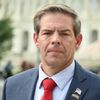Randy Zurcher
Randy Zurcher (Democratic Party) is running for election to the U.S. House to represent Georgia's 1st Congressional District. He declared candidacy for the Democratic primary scheduled on May 19, 2026.[source]
Zurcher completed Ballotpedia's Candidate Connection survey in 2025. Click here to read the survey answers.
Biography
Randy Zurcher was born in Midwest City, Oklahoma. He earned a bachelor's degree from John Brown University in 1992. His career experience includes working as the local representative for the Savannah Federation of Teachers/PSRP, Local 2069; a licensed realtor; a branch manager for a transportation company; an insurance advisor; a maintenance technician; a produce manager; and an assistant manager at a Dairy Queen during high school. Zurcher has been affiliated with AFL/CIO, Sierra Club, and AARP.[1]
Elections
2026
See also: Georgia's 1st Congressional District election, 2026
General election
The primary will occur on May 19, 2026. The general election will occur on November 3, 2026. Additional general election candidates will be added here following the primary.
General election for U.S. House Georgia District 1
Dylan Castillo is running in the general election for U.S. House Georgia District 1 on November 3, 2026.
Candidate | ||
 | Dylan Castillo (Socialist Labor Party)  | |
 = candidate completed the Ballotpedia Candidate Connection survey. = candidate completed the Ballotpedia Candidate Connection survey. | ||||
| If you are a candidate and would like to tell readers and voters more about why they should vote for you, complete the Ballotpedia Candidate Connection Survey. | ||||
Do you want a spreadsheet of this type of data? Contact our sales team. | ||||
Democratic primary election
Democratic primary for U.S. House Georgia District 1
The following candidates are running in the Democratic primary for U.S. House Georgia District 1 on May 19, 2026.
Candidate | ||
 | Defonsio Daniels  | |
 | Joyce Marie Griggs | |
 | Amanda Hollowell  | |
 | Michael McCord  | |
 | Joseph Palimeno | |
 | Sharon Stokes-Williamson | |
| Patrick Wilver | ||
 | Randy Zurcher  | |
 = candidate completed the Ballotpedia Candidate Connection survey. = candidate completed the Ballotpedia Candidate Connection survey. | ||||
| If you are a candidate and would like to tell readers and voters more about why they should vote for you, complete the Ballotpedia Candidate Connection Survey. | ||||
Do you want a spreadsheet of this type of data? Contact our sales team. | ||||
Republican primary election
Republican primary for U.S. House Georgia District 1
The following candidates are running in the Republican primary for U.S. House Georgia District 1 on May 19, 2026.
Candidate | ||
| Matt Day | ||
 | Patrick Farrell | |
| James Kingston | ||
 | Eugene Monte | |
 | Brian Montgomery | |
 | Krista Penn | |
 | Kandiss Taylor | |
 | Eugene Yu | |
 = candidate completed the Ballotpedia Candidate Connection survey. = candidate completed the Ballotpedia Candidate Connection survey. | ||||
| If you are a candidate and would like to tell readers and voters more about why they should vote for you, complete the Ballotpedia Candidate Connection Survey. | ||||
Do you want a spreadsheet of this type of data? Contact our sales team. | ||||
Endorsements
Ballotpedia is gathering information about candidate endorsements. To send us an endorsement, click here.
Pledges
Zurcher signed the following pledges. To send us additional pledges, click here.
Campaign themes
2026
Ballotpedia survey responses
See also: Ballotpedia's Candidate Connection
Randy Zurcher completed Ballotpedia's Candidate Connection survey in 2025. The survey questions appear in bold and are followed by Zurcher's responses.
| Collapse all
I’m from Spencer, Oklahoma — a small town of just 3,830. I finished high school in even smaller Adair, graduated from John Brown University in Arkansas, served two terms on the Fayetteville City Council, and have called Savannah home since 2003. I’m not a career politician — I’m a husband, father, soccer coach, union rep, and licensed Realtor. Just a regular guy standing up for working people.
I’ve always backed the underdog. My only arrest? Trying to save a historic grove of trees in the ’90s. This fight goes way back.
I started thinking seriously about this race because I couldn’t stomach what Buddy Carter has done — trying to overturn the 2020 election, turning his back on Capitol Police, and now siding with January 6th insurrectionists. He’s eyeing the Senate, and Republicans will likely run another billionaire-backed MAGA loyalist.
Not on my watch.
I’m running because it’s time we held this broken system—and those breaking it—accountable. I’ll fight to protect the benefits we’ve earned: Social Security, Medicare, Medicaid, and care for veterans. I’ll stand with working families, defend our rights, and push back against leaders who treat the Constitution like an inconvenience. This fight is personal—for all of us. And I’m ready to get to work.- Hands Off Our Earned Benefits! President Trump and the GOP gave Elon Musk and his unqualified “DOGE team” unprecedented access to vital institutions—while slashing Social Security, Medicare, Medicaid, the VA, and public services. Why? To fund tax breaks for billionaires. That’s not reform—it’s betrayal. These programs aren’t bargaining chips. We paid into them with every paycheck. Hands off. If elected, I’ll restore funding, reverse cuts, and ensure professionals—not cronies—run these services. I’ll fight to protect Social Security, Medicare, Medicaid, and the VA—because these promises must be kept. The stakes are high. Let’s defend what’s ours.
- Rule of Law: Under Threat Trump attacked judges, politicized the DOJ, defied oversight, spread election lies, and pardoned allies—all while encouraging lawlessness and punishing whistleblowers. His actions eroded public trust and undermined our democracy. As your Representative, I’ll fight to: • Strengthen congressional oversight • Reinforce DOJ independence • Protect whistleblowers and inspectors general • Ensure accountability—no one is above the law • Defend free and fair elections • Promote civic education The rule of law is not optional—it’s the foundation of our republic. Let’s defend it together.
- Money Out of Our Politics! Our democracy is under threat from oligarchic control. Corporate PACs, dark money, and billionaire donors drown out everyday Americans. That’s not just unjust—it’s un-American. My Commitment: Get Money Out of Politics If elected, I will: • Ban corporate PACs and dark money • Support a constitutional amendment to overturn Citizens United • Push for publicly funded elections to elevate small-dollar donors • Enforce real-time transparency in all political donations • Reform lobbying and close the revolving door in Washington It’s time to put people over profits and return our democracy to the voters.
I look up to Representative John Lewis, not just because he was from Georgia, but because he lived his values with courage, humility, and an unshakable sense of justice. He believed in good trouble — and he never forgot who he was fighting for: everyday people.
Like Lewis, I believe public service is about standing up for the vulnerable, even when it's unpopular or risky. He didn’t serve billionaires or corporate PACs — he served the people. His example reminds me that real leadership means showing up, telling the truth, and never backing down when working families are under attack.
I also draw inspiration from Bernie Sanders, who has spent his entire career fighting against oligarchy, corporate greed, and a political system rigged against the working class. He’s proof that you can tell the truth, take no corporate money, and still build a powerful movement.
This is a powerful history of American populism—what it really means, how it's been distorted, and how ordinary people have fought back against elite control. It’s a great lens for understanding my belief in bottom-up politics, not billionaire-backed movements.
Film: Matewan (1987, directed by John Sayles)
This dramatization of a 1920s coal miners’ strike in West Virginia shows the raw power of labor solidarity and the lengths corporations will go to crush it. It captures the spirit of the “noligarchy” movement I talk about: working people banding together against exploitation.
Essay: “Economic Inequality” by Bernie Sanders (2020)
A short but fiery read, this essay lays out the moral and structural dangers of oligarchy in America. It aligns with my stance that concentrated wealth is incompatible with a healthy democracy.
Book: Democracy in Chains by Nancy MacLean
This book exposes the long campaign by libertarian billionaires to undermine democratic institutions in favor of corporate rule. It’s eye-opening and explains a lot about how we got here—and why we need to fight back.
Integrity – An elected official must tell the truth, keep their word, and act in the public’s best interest—even when it’s inconvenient or unpopular. Without integrity, trust breaks down, and democracy suffers.
Accountability – Public servants must answer to the people they represent. That means being transparent, accessible, and willing to admit when they’re wrong or when something isn’t working.
Courage – It takes real courage to stand up to powerful interests, to call out corruption, and to vote your conscience—especially when the political winds are blowing the other way.
Empathy – Good leaders listen. They don’t just hear from the wealthy or well-connected—they make it a point to hear from working people, the marginalized, the struggling, and the overlooked.
Work Ethic – Government is not a show or a stepping stone. It’s hard work. An elected official must show up, do their homework, stay engaged, and fight every day for their constituents.
Commitment to Justice and Equality – Every decision should be guided by the principle that everyone deserves a fair shot, equal protection, and a voice in shaping their future—regardless of race, wealth, gender, or background.
Respect for Democracy and the Rule of Law – Officials must honor the Constitution, respect the separation of powers, and protect the institutions that safeguard our freedoms—even when those institutions limit their own power.
I’m not a career politician — I’m a working-class person who knows what it means to live under policies written by and for the rich. That lived experience grounds me in a few key qualities that I believe would make me a successful representative:
Authenticity
I say what I mean, and I don’t sugarcoat the truth. People are tired of spin. They want someone who speaks plainly, honestly, and with conviction.
Accountability to the People — Not the Powerful
I’m not taking corporate PAC money. My campaign is powered by working people — and that’s exactly who I’ll answer to in office.
Courage
I’m not afraid to confront the oligarchy, challenge the status quo, or take on powerful interests — whether it’s insurance companies, union-busters, or billionaire donors.
Empathy
I’ve listened to people’s struggles, and I’ve lived some of them myself. I’ll bring that perspective into every vote and every fight.
Work Ethic
I show up. Whether it’s at protests, town halls, or picket lines, I believe being present and doing the work matters — and I won’t stop once I’m elected.
Organizing Mindset
First and foremost, a Representative must be a voice for their constituents. That means listening—not just to donors or political insiders, but to working families, veterans, small business owners, farmers, union members, students, and retirees. It means showing up in every corner of the district—from Savannah to Waycross, Brunswick to Hinesville—and making sure no community is left unheard or behind.
Second, a Representative must legislate with integrity and courage. This includes drafting, supporting, or opposing laws that directly impact people’s lives—on issues like health care, jobs, infrastructure, education, environmental protection, and veterans’ services. In a district like ours, that means fighting to protect coastal communities from climate change, securing funding for rural health care and transportation, defending Social Security and Medicare, and investing in public schools and good-paying jobs.
Third, a Representative must serve as a watchdog and a check on corruption and abuse of power. The job is not just to pass laws—it’s to uphold the Constitution, ensure accountability, and protect our democracy from threats both foreign and domestic.
Finally, a Representative must be accessible, transparent, and responsive. That means holding regular town halls, answering calls and emails, and being honest—even when the truth is hard to hear.
I want to leave a legacy of standing up — unapologetically — for working people in a system that’s been rigged against them for too long.
If I can help shift power away from billionaires and corporate lobbyists and back into the hands of ordinary people — union workers, public employees, teachers, parents, veterans, and small business owners — then I’ll know I did something right.
I want to be remembered as someone who fought for justice, not status. Someone who told the truth, even when it was unpopular. Someone who used every ounce of political capital to deliver dignity, wages, healthcare, and freedom to the people who built this country — and have been ignored for far too long.
Age: 6
My very first job was at a local bowling alley called Bowling Green, a place that fancied itself a little more upscale than your typical alley. I was just 15 years old. It was 1985, and this place was proud of its modern lanes, computerized scoring (which was cutting-edge at the time), and a menu that included things like mulligan stew served in a bread bowl — at airport prices, of course.
My job? A little bit of everything. I helped customers get their games started on the new computer systems — something that confused a lot of folks, especially the older crowd. I emptied ashtrays constantly (smoking indoors was still very much a thing), and I ran a Hoky floor sweeper around the place to keep things looking clean. I made minimum wage — $3.35 an hour — and it was enough to keep gas in the tank (I had my learner’s permit), and to feed my growing collection of cassette tapes and record albums.
There were perks, too. I got to bowl at a heavily discounted rate, and eventually bought myself a custom ball and case. I got better with time — never great, but not terrible either. The alley had an arcade and a pool table, so I spent a lot of off-hours playing Tempest and shooting pool, learning geometry the fun way.
I wasn’t especially close with my coworkers, but the job taught me a lot — especially about working with the public. A good half of the job was customer service, and I learned early on the value of patience, especially with people who struggled with technology (something that still feels relevant today). I learned how to show up on time, how to follow directions, and how to take pride in doing a job well, even when it wasn’t glamorous.
Zinn doesn’t tell the story of presidents and generals. He tells the story of workers, Indigenous people, enslaved people, immigrants, women, and ordinary folks who resisted injustice in all its forms. He flips the script and shows how real change has always come from the bottom up — not from the halls of power, but from the streets, the picket lines, and the communities who refused to be silent.
That book made it clear to me that history isn’t just something that happens — it’s something people make. It’s a reminder that we’ve always had the power to fight back — and that our voices matter, even when we’re told they don’t.
I’d want to be Atticus Finch from To Kill a Mockingbird.
Atticus stands for justice, fairness, and courage — even when the odds are stacked against him and the world around him is deeply unfair. He fights for what’s right with integrity, empathy, and a steady voice. Like him, I want to be a defender of the vulnerable and a champion for truth, no matter the pressure or opposition.
“There’s hope… it doesn’t cost a thing to smile…”
I paused. Not physically — I kept driving — but something in me slowed down. The song isn’t flashy. It’s not angry. It’s not trying to win an argument. It’s just quietly, defiantly saying: you’re still here, and that means there’s still something worth fighting for.
That message landed hard. In a world where it feels like greed wins and power protects itself, that song reminded me of the strength in joy — especially when things are hard. The act of smiling, of holding onto hope, of believing in the dignity of every human being — it’s not naïve. It’s radical. Especially now.
One of the biggest struggles in my life has been trying to make a decent living in a system that too often sets working people up to fail. I’ve done hard, honest work — like laying carpet in the heat, working minimum-wage jobs, scraping by without safety nets. I even briefly worked the night shift at a chicken processing plant in Arkansas — and I still found myself fighting just to stay afloat, while watching billionaires rake in record profits.
It’s a deep kind of frustration to know you’re working harder than ever and still falling behind — not because you made bad choices, but because the rules were written by and for the wealthy. That struggle — the economic insecurity, the exhaustion, the indignity of being treated as disposable — it leaves a mark. And it’s what drives me to run.
It’s the People’s House
The House was designed to be the most directly responsive to the public. Members serve two-year terms, making them more accountable to voters and more reflective of shifting public opinion.
Proportional Representation
Unlike the Senate, which gives equal power to each state, the House is based on population. This means large states and densely populated areas have greater representation, giving more voice to where most Americans live and work.
Origin of All Spending Bills
By constitutional design, all revenue and appropriations bills must begin in the House. That gives it enormous influence over how public money is raised and spent—making it central to the national agenda.
Broad Investigative Power
The House holds sweeping investigative authority through its committees. From Watergate to January 6th, it has led many of the most consequential inquiries into executive abuse, corruption, and national scandals.
Impeachment Power
Only the House has the power to impeach federal officials, including the President. This makes it a critical check on executive overreach and a defender of constitutional norms.
Larger and More Diverse
Yes, experience can help someone navigate the system, build coalitions, and craft effective policy. But too often, career politicians become insulated from the realities their constituents face. They start serving donors, not voters.
Real-world experience—working a job, raising a family, serving in the military, organizing in a union, running a small business, or fighting for a cause—can be just as valuable, if not more. It brings perspective, urgency, and authenticity.
Economic inequality is at crisis levels. Working people are producing more than ever, but wages have stagnated while billionaires and corporations hoard record profits. This imbalance is eroding the middle class and fueling resentment, instability, and division.
Climate change poses an urgent threat, especially in coastal regions like Georgia’s 1st District. Rising seas, extreme weather, and environmental degradation aren’t distant problems—they’re here now, threatening our communities, our economy, and our health.
Democratic erosion is another grave danger. From voter suppression to dark money, gerrymandering to attacks on the rule of law, we’ve seen how fragile our democratic institutions really are. Without bold action, we risk losing the very foundation of our republic.
Healthcare access remains out of reach for too many. Even with advancements in medicine, millions of Americans struggle to afford prescriptions, doctor visits, or insurance—despite working full-time jobs.
Corporate power and corruption continue to distort our priorities. When billionaires and special interests write the rules, everyday Americans get left behind. That’s not a democracy—it’s an oligarchy in disguise.
Finally, social division and disinformation are tearing at our national fabric. We need leadership that brings people together, not one that thrives on outrage, fear, and manufactured enemies.
But in practice, it also means constant campaigning, endless fundraising, and too little time focused on governing. It gives an advantage to incumbents and the wealthy, while making it harder for working-class candidates to break through.
So while two-year terms uphold democratic responsiveness, they also undermine long-term planning and reward short-term politics. The system could work better if paired with real reforms—like public campaign financing, fair redistricting, and term limits—to make it more accessible, less corrupt, and truly representative.
John Lewis embodied the highest ideals of public service: moral courage, nonviolent resistance, relentless advocacy for justice, and unwavering loyalty to the people over power. He didn’t just serve in Congress—he lived his values, from the Edmund Pettus Bridge to the House floor.
Not long ago, in my capacity as a local union representative, I met a public school paraprofessional in a school in Savannah — a woman in her 60s who’s been working with special-needs students for over 30 years. She told me that even after decades of service, she can’t afford to retire, and her health insurance barely covers her medication. She loves her students like family, but she’s exhausted. She said to me, “I gave my life to this district. What did I get back?”
That hit me hard. Because it’s not just her story — it’s the story of millions of people who did everything right: they worked hard, played by the rules, and still got left behind while billionaires hoard the rewards. And to make matters worse, Republican-led state legislatures block them from even bargaining collectively with their fellow school employees for fair pay and decent benefits.
The billionaire grabs 11 of them, then turns to the teacher and says:
Under Article I, Section 7 of the Constitution, all bills for raising revenue must originate in the House of Representatives. That means as a member of the House, I would have a frontline role in shaping how and from whom the government collects money — and how that money serves the people.
Our current Republican-led House of Representatives seems to have abdicated this power and given it to the Executive Branch.
If I am elected, this power will become a tool to:
Prioritize working families over billionaires
I will fight to shift the tax burden off the working class and ensure that the ultra-wealthy, giant corporations, and Wall Street finally pay their fair share.
Fund the programs our community needs
Whether it’s fully funding public schools, expanding rural healthcare, preventing planned cuts in Medicaid or protecting Social Security and Medicare, I’ll have direct input on how federal dollars are raised and where they go.
Block tax schemes that hurt our district
I can oppose and stop regressive tax bills that benefit the rich at the expense of everyday Georgians — because those bills must pass through the House first.
Demand a moral budget
Hold the powerful accountable
Congress must investigate corporate corruption, tax evasion, price-gouging, union-busting, environmental abuse, out-in-the-open corruption, and the exploitation of working people — not just in theory, but in practice. No CEO, billionaire, or former president should be above the law.
Expose government failure and abuse
Investigative power is essential to uncovering waste, fraud, mismanagement, and human rights violations in federal agencies — whether it's within ICE, the VA, the Department of Defense, or any other institution.
Protect democracy from threats
The House must investigate efforts to undermine elections, spread disinformation, or incite political violence — no matter who’s responsible. Defending democracy requires more than speeches; it demands action.
Advance real solutions
Investigations should not be political theater — they should lead to legislation. When investigations reveal broken systems, Congress has a duty to fix them with new laws, protections, and oversight.
Shine a light on what’s hidden from the public
From wage theft to toxic pollution, so much harm happens in the shadows. Investigations are how the people’s House brings the truth to light — especially when other institutions stay silent.
1. House Committee on Appropriations
Controls federal spending. Every dollar the government spends passes through this committee. It sets priorities for everything from defense to education to infrastructure.
2. House Committee on Energy and Commerce
Oversees a huge range of issues: healthcare, energy policy, consumer protection, climate change, telecommunications, and more. Highly influential in shaping domestic policy.
3. House Committee on Education and the Workforce
Covers public education, labor laws, workplace protections, union rights, and worker wages—critical for working families and students.
4. House Committee on Oversight and Accountability
Note: Ballotpedia reserves the right to edit Candidate Connection survey responses. Any edits made by Ballotpedia will be clearly marked with [brackets] for the public. If the candidate disagrees with an edit, he or she may request the full removal of the survey response from Ballotpedia.org. Ballotpedia does not edit or correct typographical errors unless the candidate's campaign requests it.
Campaign finance summary

See also
2026 Elections
External links
Footnotes
- ↑ Information submitted to Ballotpedia through the Candidate Connection survey on August 11, 2025







